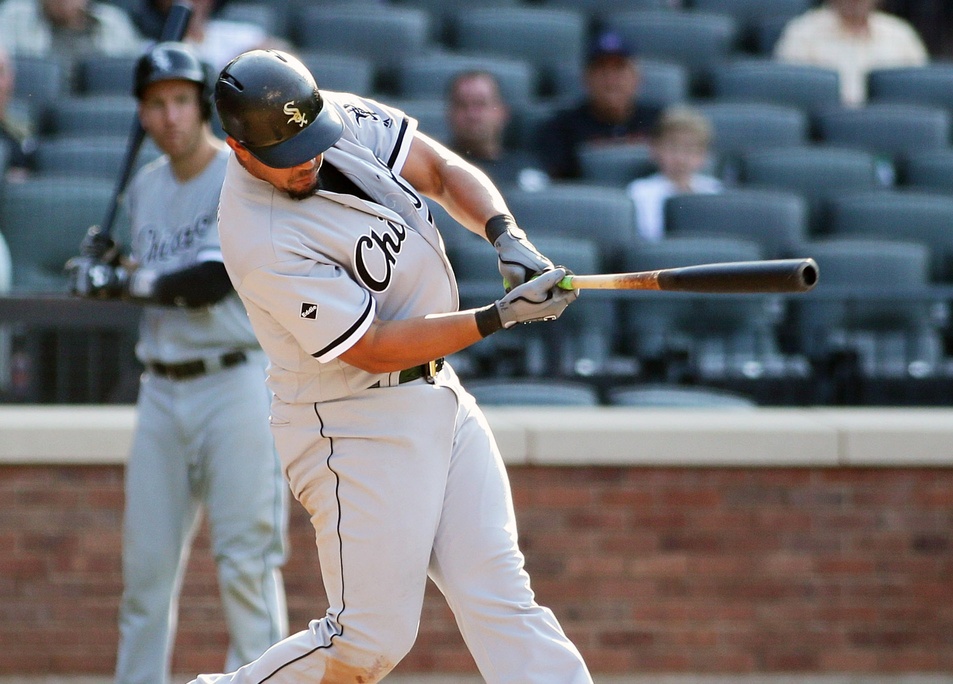For a few moments on Wednesday, Matt Albers stepped up to be the big and lumbering power-hitting presence in the middle of the White Sox lineup that has been missing for most of 2016, and kick-started a cathartic game-deciding rally. The very next batter, Jose Abreu dug in, as a reminder of where that presence has been. In a key spot against a wild and struggling Logan Verrett, Abreu was a ghost of himself with just enough resonance to hang in after a 1-2 count, foul off a few pitches and flick a deep, but pedestrian fly to right-center and plate the deciding run.
It wasn’t invigorating, but it left a better taste behind than his otherwise 0-for-5 day at the plate, which was replete with Abreu being repeatedly overwhelmed by fastballs in the zone; good ones, but the type of offerings that it used to be an act of derring-do to leave within Abreu’s reach. Above it all, he just looked awful. Slow to the ball, distracted, guessing wrong; any explanation for his struggles anyone would choose to offer at least sounded like it half-fit the problem, and we’ve already been over how much inside pitching he has faced, and how his kill zone has shrunk.
A challenge for national writers, analysts, and even scouts, is assessing a player without full context. Our challenge is dealing with too much. We sit through every Abreu at-bat, see every flat fastball and cement mixer slider that he pops up or jams himself with–and it really adds up in a short stretch of time–and cannot help but see a pattern. But remove the name, or maybe even slap Chris Davis‘ name on if it helps, and consider hearing the news that a hitter or Chris Davis put up a .303/.364/.540 line over the last two seasons, but is coming off two awful months, is 29-years-old and now he’s on the team for the rest of the year.
A rebound would seem inevitable, and almost undoubtedly is. As grueling and awful as Adam Dunn was in 2011, and unthinkable it was while watching him to believe that he would ever be productive again, the cold, seemingly blind statistical analysis that he would bounce back in 2012 was dead on.
But it was definitely the beginning of the end. Big slumps are not death knells, but they’re also not meaningless. As much as being committed to Dunn through his early flop and slow fade hamstrung the Sox from seeking alternatives, the prospects of Abreu–always warned to a big-body player without plus athleticism who could age quickly and poorly–being in decline would send even deeper ripples through the organization’s future.
And in the immediate, it could cripple this season, which has not had all its promise wrung out just yet. Any time the topic of Abreu has been raised during postgame media scrums, the responses from teammates and coaches has been some variation of “he’ll be fine,” or “we know he’ll be fine,” and sometimes, in truly verbose moments, “he knows what he needs to do, and he’ll be fine.”
What else is there to say?
There is no alternative. As difficult as needing to pivot from reliance on Abreu would be over the next few years, it’s impossible in 2016. No franchise-anchoring bat is available in the trade market or on the waiver wire. A common rebuttal whenever fans or media get caught up in a certain move they want to see made is to point out how marginal it is. A hastily named replacement for an incompetent manager, a top prospect getting his feet wet at the highest level, a slightly above-average veteran riding a hot streak coming over for a half-season rental, are all hard-pressed to provide more than an extra win by themselves, and it’s a rare division race that can turned by so little.
This doesn’t make these moves not worth doing, and anyone knows there’s a list of to-do items the Sox could stand to put their focus to over the next month, but it pales in importance to whether Abreu, a five-to-six win player at his peak by most measures, can return to form quickly or if–or for how long–he remains a replacement-level ghost. It may be hard for one win to change a season, but a far sight easier for three-to-four to have that effect.
One player doesn’t dictate the whole season, but the White Sox are four games over .500 despite Abreu’s .242/.305/.379 start because the rest of their core (Chris Sale, Jose Quintana, Adam Eaton, Todd Frazier) has mostly been as advertised, and in some cases, better. Abreu is the only figure in flux, and until he falls into place, even if every needed trade, call-up and roster tweak is made, we won’t know what the Sox can be.
Lead Image Credit: Andy Marlin // USA Today Sports Images
